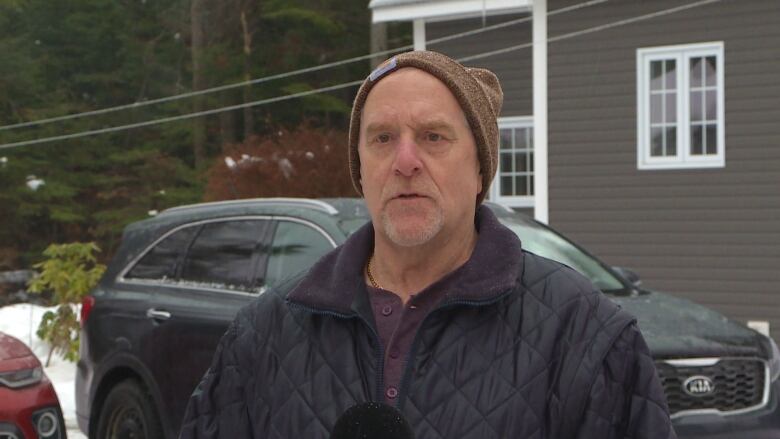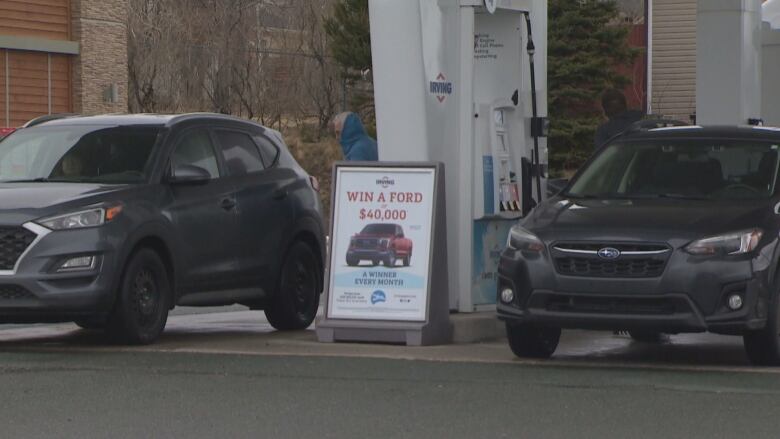The cost of commuting is getting higher, and these N.L. drivers are feeling the pinch
Price of gas has set new record after new record in recent weeks

Gas prices are down slightly in Newfoundland and Labrador, but it doesn't mean much to the drivers feeling thepinch at the pump, which has seen record high after record high in recent months.
The maximum price of gasoline dropped1 cents per litre Thursday the first drop in prices since Dec. 16.
Prices vary across the province, but a litre of unleaded self-serve will now cost as much as $1.73 on the Avalon Peninsula. Drivers will pay as much as $1.74 in Deer Lake and Corner Brook, $1.75 in central Newfoundland and nearly $1.80 in western Labrador.
According to Wade Locke, acting head of the Department of Economics at Memorial University, there are several factors that play into high gas prices, including high inflation, gas taxes and carbon taxes and the price of oil rising as markets begin to move out of the latest wave of COVID-19.
For Victoria Battcock of Cape Broyle, the prices aren't a welcome sight.
"I hate to go to the gas station, and I dread reading the gas story every Thursday," Battcocksaid Monday. "It's painful."
Battcock commutes five days a week from Cape Broyle to St. John's, a round trip of 130 kilometres. It takes $94 to fill her Nissan Qashqai.
"Before this year, I didn't even look but lately I've had to kind of look at the numbers and kind of figure it out," she said.
"I fill up more than once a week, so it's not just a once a week 'oh, here's my gas money' kind of thing.' I'll be driving back and forth, and then by Wednesday night or Thursday I'll have to fill it up again."

Eric Legge of Cartyville on Newfoundland's west coast is in a similar position. Legge works as a nurse in Stephenville Crossing, commuting over 110 kilometres each trip.
"Over the past six to eight months, we have found that our gasoline prices increasing dramatically, probably up by an extra 30 per cent. Right now, that's costing us an additional I would say six or seven dollars on a round trip," Legge said last week.
"Seven trips in two weeks, you're probably talking close to 170 to 200 dollars extra."
I don't know if it's worth driving back and forth right now, or if I should look for places in St. John's.- Victoria Battcock
The rise in gas prices, paired with rising inflation across the country, is forcingLegge and Battcock to look at the bigger picture when it comes to budgeting and spending.
"You have to be aware of [it] and make sure that you have enough dollars kept aside before the next pay period," Legge said. "So you always to be very much aware of the cost of going to work."
Battcock is also facing another tough question as prices rise whether it makes sense to live outside the capital city.
She's renovating a home in Calvert, about 10 minutes south of where she lives now,but says the price of gas is changing how she views the space.
"I decided, 'OK, this will be my home in 2022.' But now I'm kind of sizing things up, wondering should I just make it a cabin or a future rental instead of living there," Battcock said.
"I don't know if it's worth driving back and forth right now, or if I should look for places in St. John's so that I can have a shorter commute and spend less money on gas."
Prices likely to keep rising: Locke
As prices continue to set new records in Newfoundland and Labrador, Locke said it's likely prices will have a big impact on the province's economy and expects prices to only go higher in the short-term future.

"Higher gas prices will translate into higher, for example, food prices, because we have to transport things to the island. So those two things together will impact people. The lower your income, the more significantly those will impact," Locke said.
"I don't see any good news in terms of the short term or the medium term in terms of gas prices, especially with the acceleration of carbon taxes that we're expecting."
It's a stinging feeling for drivers like Battcock, who is calling on the provincial government to make prices more manageable.
"It's all these expenses that we're not used to, and our money that we're making is not going up," Battcock said. "There has to be something they can do."
With files from Troy Turner












_(720p).jpg)


 OFFICIAL HD MUSIC VIDEO.jpg)
.jpg)



























































































